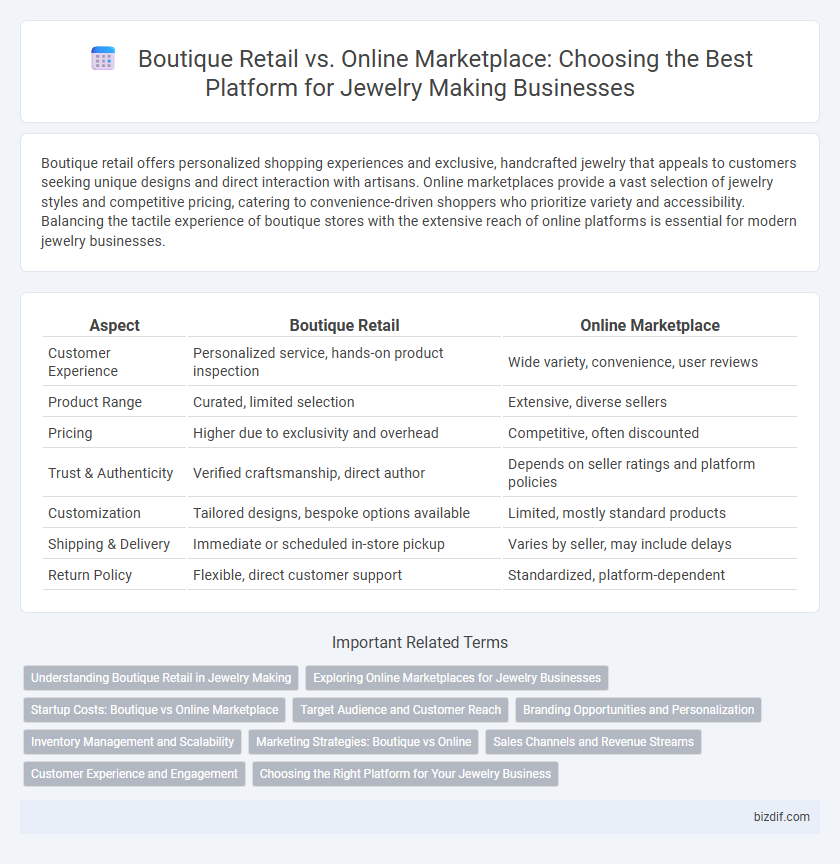Boutique retail offers personalized shopping experiences and exclusive, handcrafted jewelry that appeals to customers seeking unique designs and direct interaction with artisans. Online marketplaces provide a vast selection of jewelry styles and competitive pricing, catering to convenience-driven shoppers who prioritize variety and accessibility. Balancing the tactile experience of boutique stores with the extensive reach of online platforms is essential for modern jewelry businesses.
Table of Comparison
| Aspect | Boutique Retail | Online Marketplace |
|---|---|---|
| Customer Experience | Personalized service, hands-on product inspection | Wide variety, convenience, user reviews |
| Product Range | Curated, limited selection | Extensive, diverse sellers |
| Pricing | Higher due to exclusivity and overhead | Competitive, often discounted |
| Trust & Authenticity | Verified craftsmanship, direct author | Depends on seller ratings and platform policies |
| Customization | Tailored designs, bespoke options available | Limited, mostly standard products |
| Shipping & Delivery | Immediate or scheduled in-store pickup | Varies by seller, may include delays |
| Return Policy | Flexible, direct customer support | Standardized, platform-dependent |
Understanding Boutique Retail in Jewelry Making
Boutique retail in jewelry making emphasizes personalized customer experiences and exclusive, handcrafted pieces that highlight artisanal craftsmanship. This sales approach allows jewelers to build direct relationships with clients, offering tailored consultations and bespoke designs that online marketplaces cannot easily replicate. Maintaining an intimate retail setting supports brand storytelling and enhances perceived value through curated collections and superior customer service.
Exploring Online Marketplaces for Jewelry Businesses
Online marketplaces offer jewelry businesses access to a global customer base, significantly increasing visibility compared to boutique retail stores limited by location. These platforms provide built-in tools for inventory management, customer reviews, and targeted advertising, enhancing sales potential and brand reputation. Leveraging data analytics from online marketplaces allows jewelers to optimize marketing strategies and identify trending styles more effectively than traditional boutique settings.
Startup Costs: Boutique vs Online Marketplace
Startup costs for jewelry making vary significantly between boutique retail and online marketplaces. Boutique retail requires substantial investment in physical storefronts, inventory, and interior design, often exceeding $50,000, while online marketplaces demand lower initial expenses primarily covering website setup, product photography, and marketing, typically under $10,000. Entrepreneurs seeking cost-efficiency and broader reach frequently prefer online marketplaces for minimizing upfront financial risk.
Target Audience and Customer Reach
Boutique retail in jewelry making targets niche customers seeking personalized, high-quality pieces and direct interaction with artisans, enhancing brand loyalty through exclusive experiences. Online marketplaces expand customer reach exponentially by offering diverse price ranges and styles, appealing to a global audience with convenience and accessibility. Brands choosing boutique retail capitalize on local demographics and bespoke services, while online platforms leverage digital marketing to attract mass-market buyers.
Branding Opportunities and Personalization
Boutique retail offers unparalleled branding opportunities through curated in-store experiences and direct customer engagement, allowing jewelers to create a unique identity and foster loyalty. In contrast, online marketplaces provide broad reach and personalized product options using data-driven customization tools that cater to diverse consumer preferences. Both platforms enhance personalization but differ significantly in how brand narratives and customer interactions are shaped within the jewelry-making industry.
Inventory Management and Scalability
Boutique retail in jewelry making allows for direct control over inventory, ensuring exclusive, high-quality pieces are carefully curated, but scalability is limited by physical space and local demand. Online marketplaces offer vast scalability with access to a global customer base, leveraging advanced inventory management systems to handle large product volumes and real-time stock updates. Efficient integration of inventory software on online platforms enables seamless scaling while minimizing stockouts and overstock issues common in boutique settings.
Marketing Strategies: Boutique vs Online
Boutique retail jewelry marketing emphasizes personalized customer experiences, in-store exclusives, and local community engagement to build strong brand loyalty and word-of-mouth referrals. Online marketplace strategies prioritize SEO optimization, targeted digital advertising, and leveraging social media platforms to reach a broader, tech-savvy audience quickly. Both approaches utilize data analytics, but boutiques focus on intimate customer data, whereas online sellers optimize for search algorithms and user behavior patterns.
Sales Channels and Revenue Streams
Boutique retail in jewelry making offers personalized customer experiences and higher profit margins through direct sales, leveraging exclusivity and brand reputation to drive revenue. Online marketplaces expand reach with broader customer access and lower overhead, generating income from volume sales and commission fees. Combining both channels can optimize sales diversity and stabilize revenue streams in a competitive market.
Customer Experience and Engagement
Boutique retail in jewelry making offers personalized customer experience through face-to-face interaction, tailored advice, and immediate product access, fostering strong brand loyalty. Online marketplaces provide convenience and a vast selection, enabling customers to compare styles and prices easily while benefiting from reviews and user-generated content. The engagement level in boutique stores is typically higher due to sensory elements and trust-building, whereas online platforms leverage algorithms and digital tools to enhance user journey and targeted marketing.
Choosing the Right Platform for Your Jewelry Business
Boutique retail offers personalized customer experiences and brand exclusivity, essential for high-end jewelry businesses seeking direct client relationships and premium presentation. Online marketplaces provide vast reach, lower overhead costs, and access to diverse customer bases, ideal for emerging jewelers aiming for rapid growth and scalable sales. Evaluating factors such as target audience, marketing budget, and desired brand positioning is crucial when choosing between boutique retail and online marketplaces for a jewelry business.
Boutique Retail vs Online Marketplace Infographic

 bizdif.com
bizdif.com